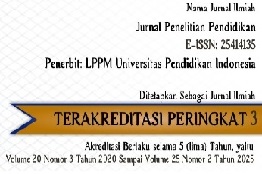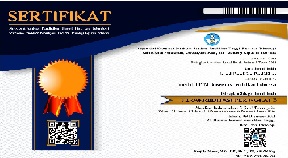Tiktok as a Formative Assessment in English Classes
Abstract
Keywords
Full Text:
PDFReferences
Barkhuizen, G. (2014). Narrative research in language teaching and learning. Language Teaching, 47(4), 450-466.
Brounéus, K. (2011). In-depth interviewing: The process, skill and ethics of interviews in peace research. In Understanding Peace Research (pp. 130-145). Routledge.
Cahyono, A. O. M., & Perdhani, W. C. (2023). Using TikTok in EFL Class: Students’ Perceptions. Journal of English Education and Teaching, 7(1), 59-77.
Caine, V., Clandinin, J., & Lessard, S. (2021). Considering response communities: Spaces of appearance in narrative inquiry. Qualitative Inquiry, 27(6), 661-666.
Creswell, J. W. (2014). Research design: Qualitative, quantitative, and mixed methods approaches. (4th ed.). Thousand Oaks: Sage.
Escamilla-Fajardo, P., Alguacil, M., & López-Carril, S. (2021). Incorporating TikTok in higher education: Pedagogical perspectives from a corporal expression sport sciences course. Journal of Hospitality, Leisure, Sport & Tourism Education, 28, 100302. https://doi.org/10.1016/j.jhlste.2021.100302
Hamayan, E.V. (1995). Approaches to Alternative Assessment. Annual Review of Applied Linguistics, 15, 212 - 226.
He, W., Zhang, Z. J., & Li, W. (2021). Information technology solutions, challenges, and suggestions for tackling the COVID-19 pandemic. International journal of information management, 57, 102287.
Herman, J. L., Aschbacher, P. M., & Winters, L. (1992). A practical guide to alternative assessment. Association for Supervision & Curriculum Development.
Kaplan, Andreas M. & Haenlein, Michael, (2010). Users of the world, unite! The challenges and opportunities of Social Media, Business Horizons, Elsevier, vol. 53(1), pages 59-68
Kuning, D. S. (2019). Technology in Teaching Speaking Skill. Journal of English Education, Literature and Linguistics, 2(1), 50–59. https://doi.org/10.31540/jeell.v2i1.243
Kvale, S., & Brinkmann, S. (2009). Interviews: Learning the craft of qualitative research interviewing. sage.
Loren, F. T. (2017). The use of learning media on listening skill in teaching Indonesian to speakers of other language (TISOL). Lingua Didaktika: Jurnal Bahasa Dan Pembelajaran Bahasa, 11(1), 1. https://doi.org/10.24036/ld.v11i1.7625
Michos, T. (2022). Using TikTok as a Mobile Assisted Language Learning (MALL) application to examine the potential effects on Greek EFL learners' listening and speaking skills.
Puplampu, G. L., Caine, V., & Clandinin, J. D. (2020). Sustaining hope: A narrative inquiry into the experiences of hope for nurses who work alongside people living with HIV in Ghana. Nursing open, 7(3), 879-886.
Rahmawati, R., Khoiriyah, K., & Aji, M.P.P. (2022). The impact of using TikTok on the students listening skill at the 10th grade of SMK PGRI 3 Kediri (Doctoral dissertation, Universitas Nusantara PGRI Kediri).
Rajendran, T., & Md Yunus, M. (2021). A systematic literature review on the use of Mobile-Assisted Language Learning (mall) for enhancing speaking skills among ESL and EFL learners. International Journal of Academic Research in Progressive Education and Development, 10(1). https://doi.org/10.6007/ijarped/v10-i1/8939
Silaban, M. C. A., & Purba, R. (2021). Improving Student's Listening Skills Using Tiktok at SMP Swasta Amalyatul Huda Medan. Jurnal Ilmiah Profesi Pendidikan, 6(4), 650-656.
Sumaharani, N. K., Artini, L. P., & Padmadewi, N. N. (2023). The implementation of using formative assessment on student speaking skills during online learning. Journey: Journal of English Language and Pedagogy, 6(2), 448–457. https://doi.org/10.33503/journey.v6i2.3201
Wahyuni Oktavia, S., & Kunci, K. (2015). Inovasi Model Partisipasi Solusi (Partisol) Untuk Meningkatkan Keterampilan Berbicara Siswa. Seminar Nasional Pendidikan Bahasa Indonesia, 2477–2636.
Wanner, T., & Palmer, E. (2018). Formative self-and peer assessment for improved student learning: The crucial factors of design, teacher participation and feedback. Assessment & Evaluation in Higher Education, 43(7), 1032–1047. https://doi.org/10.1080/02602938.2018.1427698
Weurlander, M., Söderberg, M., Scheja, M., Hult, H., & Wernerson, A. (2012). Exploring formative assessment as a tool for Learning: Students’ experiences of different methods of formative assessment. Assessment & Evaluation in Higher Education, 37(6), 747–760. https://doi.org/10.1080/02602938.2011.572153
Wijaya, K. F. (2022). The Utilities of Online Formative Assessment in Indonesian EFL learning contexts during covid-19 ERA. Journal of Foreign Language Teaching and Learning, 7(2), 178–198. https://doi.org/10.18196/ftl.v7i2.14249
Xiuwen, Z., & Razali, A. B. (2021). An overview of the utilization of TikTok to improve oral English communication competence among EFL undergraduate students. Universal Journal of Educational Research, 9(7), 1439–1451. https://doi.org/10.13189/ujer.2021.090710
Yang, H. (2020, June). Secondary-school Students’ Perspectives of Utilizing Tik Tok for English learning in and beyond the EFL classroom. In 2020 3rd International Conference on Education Technology and Social Science (ETSS 2020) (Vol. 1, pp. 162-83).
DOI: https://doi.org/10.17509/jpp.v23i3.61198
Refbacks
- There are currently no refbacks.
Copyright (c) 2024 Jurnal Penelitian Pendidikan
ISSN: p.1412-565X e.2541-4135
Jurnal Penelitian Pendidikan (JPP), Universitas Pendidikan Indonesia 
This work is licensed under a Creative Commons Attribution-ShareAlike 4.0 International License


